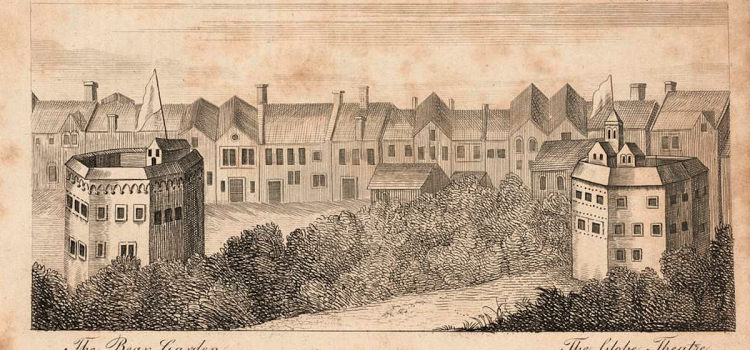
What happened during Shakespeare’s early days in London? How did an unknown writer from the countryside become the city’s most celebrated playwright?
In his book Shakespeare, Bill Bryson explores Shakespeare’s life in London during the bustling Elizabethan era. Shakespeare’s journey from obscurity to fame unfolded against the backdrop of a city teeming with opportunity and artistic expression.
Read on to uncover the fascinating details of Shakespeare’s transformation from a provincial actor to London’s theatrical genius.
Shakespeare’s Life in London
Shakespeare’s transformation from an unknown provincial figure to a celebrated playwright took place within London’s dynamic theater scene. Shakespeare’s life in London likely began in the late 1580s, and he quickly established himself as both a respected performer and an in-demand playwright, contributing significantly to the city’s evolving theatrical landscape.
London during the Elizabethan era, as Bryson describes, was characterized by its swelling population, poor sanitation, vibrant theater culture, and complex social hierarchy. The city’s rapid expansion, driven by an influx of ambitious individuals from various regions and a growing number of dedicated theaters, created an ideal environment for the dramatic arts to flourish.
Despite lacking initial connections, Shakespeare’s rise to prominence in London’s theatrical world was remarkably smooth. His talents as both actor and writer earned him swift recognition, leading to a significant position within the prestigious Lord Chamberlain’s Men acting company.
| Shortform Note William Shakespeare’s journey to becoming London’s preeminent playwright is marked by both mystery and achievement. Before arriving in London, he likely gained some experience in acting and writing in Stratford-upon-Avon, which helped ease his transition into the city’s theater scene. Though little documentation exists about his early years in London, making his rapid rise even more remarkable, Shakespeare eventually became associated with one of the leading theatrical companies patronized by Henry Carey, the Lord Chamberlain, which provided both prestige and financial support. His works not only reflected and critiqued societal norms and politics but also encouraged audiences to engage with contemporary issues, thus elevating theater’s role in public discourse. Moreover, his plays contributed significantly to the English language, introducing words and phrases still in use today. The London of Shakespeare’s time was a city of striking contrasts and cultural dynamism. While the city saw improvements in infrastructure such as roads and bridges that facilitated movement, it also struggled with sanitation issues, including open sewers and cesspits that often overflowed during rain. Theaters of the period were typically open-air, with performances held during daylight hours, and served as melting pots where people from different social classes could gather despite strict sumptuary laws that regulated clothing based on social rank. The city’s relative religious tolerance attracted those fleeing persecution from other parts of Europe, contributing to London’s vibrant cultural and social atmosphere, which in turn influenced the rich tapestry of Shakespeare’s works. |
The Lord Chamberlain’s Men
Shakespeare found his creative home with the Lord Chamberlain’s Men, one of London’s most prestigious theater companies, which later became known as the King’s Men after James I assumed the throne. This association proved instrumental in solidifying Shakespeare’s reputation and success. The company’s remarkable stability was particularly noteworthy during an era when theater groups frequently disbanded and actor turnover was high.
The enduring partnership between Shakespeare and his fellow performers distinguished the company from its contemporaries. As Bryson notes, the organization’s success stemmed from the unwavering dedication of its professional members. The company’s prestigious standing, further enhanced by royal patronage under James I, contributed significantly to Shakespeare’s artistic and financial prosperity.
The supportive and collaborative environment within the company allowed Shakespeare to concentrate on his dual roles as playwright and performer. The stable, nurturing atmosphere proved ideal for his creative endeavors, while the company’s royal connections helped elevate his status in London’s theatrical world.
| Shortform Note Shakespeare’s involvement with the Lord Chamberlain’s Men, later known as the King’s Men, was instrumental to his success as a playwright and performer. Acting companies were the backbone of theatrical production during this era, managing everything from staging plays to maintaining a roster of actors, playwrights, and financial stakeholders. As a shareholder in the company, Shakespeare secured both creative freedom and financial stability, enabling his prolific writing career. The company’s privileged status set it apart from many of its contemporaries. While most acting companies struggled with temporary performance spaces and faced ongoing financial and legal challenges, the King’s Men enjoyed special protections and social privileges thanks to their royal patronage. This stability, combined with the company’s growing reputation, helped Shakespeare’s works reach a broader audience and contributed significantly to his lasting legacy in theater history. |
Shakespeare & the Earl of Southampton
Shakespeare’s connection to influential aristocrats, particularly the Earl of Southampton, played a crucial role in his career. His dedications of the poems “Venus and Adonis” and “The Rape of Lucrece” to the young Earl demonstrated his ties to nobility and possibly represented an effort to secure patronage.
Bryson examines this relationship with Southampton, who was known for his extravagant and effeminate nature. The Earl’s life took a dramatic turn when he participated in a failed rebellion against Queen Elizabeth, led by the Earl of Essex.
The nature of Shakespeare’s relationship with Southampton has been a subject of scholarly discussion. While some interpret the dedications as evidence of a deep personal connection, possibly even romantic, Bryson maintains that such conclusions are purely speculative. He emphasizes that these dedications should be viewed primarily in the context of Shakespeare’s broader pursuit of aristocratic patronage.
| Shortform Note The relationship between Shakespeare and the Earl of Southampton has been a subject of much scholarly debate, particularly regarding the nature and motivation behind Shakespeare’s dedications. While these dedications could be interpreted as calculated attempts to secure patronage, they might equally represent genuine expressions of admiration or friendship. The language employed, though undeniably flattering, was characteristic of the literary conventions of the time and shouldn’t necessarily be construed as evidence of a deeper romantic connection between the two men. Furthermore, historical accounts of this relationship must be approached with careful consideration. While Southampton’s involvement in the Essex Rebellion is documented, his role may have been less significant than some historical narratives suggest. It’s also worth noting that although patronage was a common practice during the Elizabethan era, not all artists depended on noble benefactors; some, including potentially Shakespeare himself, may have achieved success through other means such as public performances and sales. In examining these historical relationships, we must be cautious not to equate speculative theories with well-researched scholarly conclusions, maintaining a distinction between evidence-based interpretations and more tenuous suppositions. |






